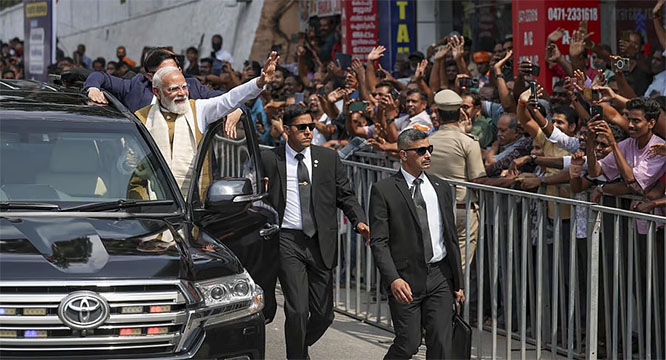Colombo, Apr 22: At least 290 are now known to have died in a series of bomb blasts that tore through churches and luxury hotels in Sri Lanka, in the worst violence to hit the island since its devastating civil war ended a decade ago.
Eight apparently co-ordinated explosions targeted Easter worshippers and high end hotels popular with international guests.
The horrific death toll, which has risen dramatically overnight, was given on Monday morning by a police spokesman, who said a further 500 people had been wounded.
The news came hours after it was revealed that an improvised bomb discovered at the main airport in Colombo had been defused.
A nationwide curfew imposed shortly after the blasts was lifted early Monday. There was still a heavy security presence at the city's St Sebastien's Church, the scene of one of the devastating blasts.
President Maithripala Sirisena, who was abroad when the attacks happened, had called a meeting of the National Security Council early on Monday. Prime Minister Ranil Wickremesinghe would attend the meeting, the source said.
Sri Lanka's small Christian minority — just six percent of the 21 million-strong population — has been targeted by violence in the past, but never to such brutal effect.
There was no immediate claim of responsibility, but police said on Monday 24 people had been arrested. The government earlier said investigators would to look into whether the attackers had "overseas links".
The powerful blasts — six in quick succession and then two more hours later — wounded around 450 people.
At least two of the explosions involved suicide bombers, including one who lined up at a hotel breakfast buffet before unleashing carnage.
Six Indians killed in blasts
The police said on Monday that at least six Indian nationals have been reported among the foreigners who died in the blasts.
External affairs minister Sushma Swaraj on Monday identified two more individuals killed in the blasts on Sunday.
"We sadly confirm the deaths of the following two individuals in the blasts yesterday, K G Hanumantharayappa and M Rangappa," Swaraj retweetd Indian High Commission in Colombo's tweet.
On Sunday, Swaraj, in a series of tweets, identified the three Indians as Lakshmi, Narayan Chandrashekhar and Ramesh.
"Indian High Commission in Colombo has conveyed that National Hospital has informed them about the death of three Indian nationals," she said in a tweet.
Intel on attacks
Sri Lanka's police chief Pujuth Jayasundara had issued an intelligence alert to top officers 10 days ago, warning that suicide bombers planned to hit "prominent churches".
"A foreign intelligence agency has reported that the NTJ (National Thowheeth Jama'ath) is planning to carry out suicide attacks targeting prominent churches as well as the Indian high commission in Colombo," the alert said.
The NTJ is a radical Muslim group in Sri Lanka that was linked last year to the vandalisation of Buddhist statues.
Prime Minister Ranil Wickremesinghe acknowledged that "information was there" about possible attacks and that an investigation would look into "why adequate precautions were not taken".
Ethnic and religious violence has plagued Sri Lanka for decades, with a 37-year conflict with Tamil rebels followed by an upswing in recent years in clashes between the Buddhist majority and Muslims.
Embassies in the capital warned citizens to stay inside, while there were chaotic scenes at Colombo airport as travellers formed huge lines at the only taxi counter that was open.
Sri Lankans anxious over what's to come
Bhanuka Harischandra was running a little late for his meeting on Sunday.
As a car carrying him pulled into the back entrance of the luxury Shangri-La Hotel in Sri Lanka's capital of Colombo, he realized something was wrong.
People were telling him not to come in, it wasn't safe. Still, the car pulled around to the front of the hotel and Harischandra saw the aftermath of a bombing. People were being evacuated, others were being dragged. Blood and ambulances were everywhere.
"It was panic mode," Harischandra, a 24-year-old founder of a tech marketing company, said by telephone later in the day. "I didn't process it for a while."
He decided to go to the Cinnamon Grand Hotel, where he thought it would be safe. But just after he was dropped at the luxury hotel and about to enter the building, he heard another bomb go off.
Now he was being evacuated. Soot and ash fell on his white sweat shirt.
His car had left, so he hailed a motorized rickshaw and went to meet friends at a coffee shop. They contacted other friends, trying to make sure everyone they knew was safe.
It was too soon to think about what it might mean.
Over the course of the day, a series of bombs exploded, including at churches and luxury hotels, killing more at least 290 people. The Easter Sunday violence was the deadliest the South Asian island country has seen since a bloody civil war ended a decade ago.
Many Sri Lankans remember well the terror of the 26-year war. But not Harischandra, who was just a teenager when it officially ended. Toward the end, the conflict was not in Colombo. Growing up, he was mostly aware of his parents' anxiety about safety, not of actual fighting.
Now their anxiety is back.
"For them, it's a bit of a different situation," he said. "They're afraid this might start racial violence."
On Sunday night, he was with his family, observing a curfew. He said there was "a lot of tension" in the air, but he was also hoping that the worst might be over: It had been a few hours since the last blast.
Harischandra was heartened by the fact that his social media feed was flooded with photos of the lines of people waiting to give blood. Lines so long "you can't see the end."







Comments
Add new comment